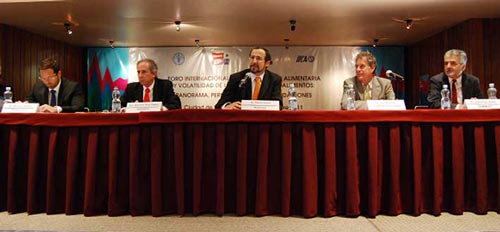The World Food Day was established in 1979 by the United Nations Food and Agriculture Organization (FAO) to raise awareness of the global food problem and strengthen solidarity against hunger, malnutrition and poverty. To commemorate World Food Day 2011, an international forum on “Food Security and Price Volatility: Scope, Perspectives, and Recommendations” took place during 17-18 October at the Sevilla Palace Hotel, Mexico City. The event was convened by FAO’s representatives in Mexico, the Ministry of Agriculture, Livestock, Rural Development, Fisheries and Food (SAGARPA), the Latin American Economic Commission (CEPAL), and the Inter- American Institute for Cooperation on Agriculture (IICA).

Over two days, participants from national and international policy and research organizations, public and private sector, and scholars and representatives from Argentina, Brazil, Canada, Chile, Costa Rica, Colombia, and the United States, exchanged experiences on the causes and effects of food price volatility, an issue which has an important impact on food security. They also explored options for public policy to reduce volatility, and identified elements to prepare a shared or coordinated agenda among countries and international organizations. Presentations ranged from the FAO outlining the establishment of a more efficient way to track fluctuating food prices, to details on the Brazilian government’s support of production at a family farm level.
Jonathan Hellin, Value Chain and Poverty Specialist for CIMMYT’s Socio-economics program (SEP), gave a presentation highlighting the importance of research and extension provision in meeting the challenges of increasing agricultural production and enhancing farmers’ access to markets. With the forum’s focus on policy issues, Hellin cited MasAgro, a coordinated initiative between CIMMYT and SAGARPA, as an example of integrated efforts between the public and private sectors to sustainably boost crop productivity. There are already visible, positive results from this project, such as increased interactions between scientists and small-scale farmers, and the benefits of MasAgro will be measurable in terms of Mexico’s wheat and maize production, added Hellin.
SAGARPA Undersecretary Mariano Ruiz-Funes reiterated the potential of MasAgro. “It starts from the plot, fosters commerce through contract farming, and adds value to products —with support of the Postharvest Management Program— allowing the development of a local market,” he said. Ruiz-Funes added that MasAgro is the most important program of recent years because it provides support directly to small farmers to promote higher crop yields, particularly in rainfed regions.

